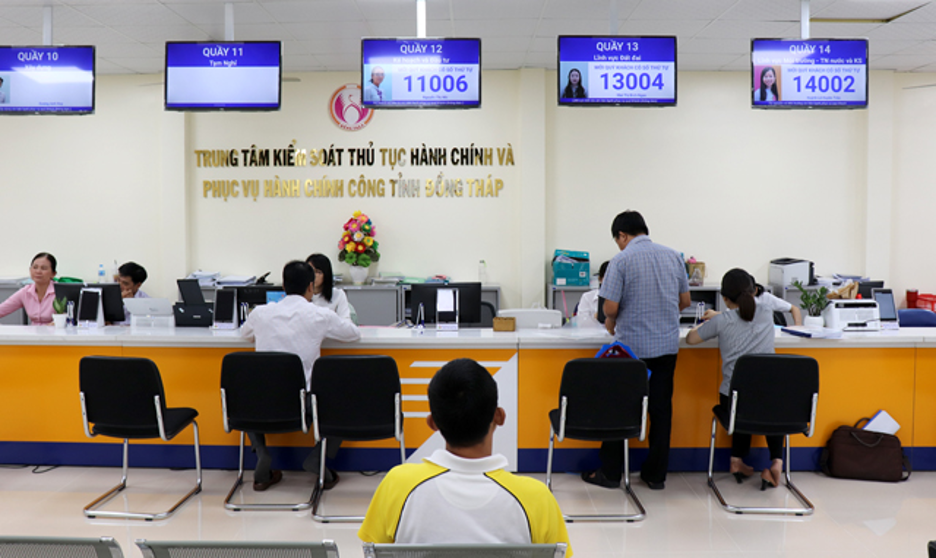Some solutions to implement administrative procedure reform in the upcoming time in Vietnam
Report 248/BC-CP 2024 mentions a number of solutions to reform administrative procedures in the upcoming time in Vietnam.

Some solutions to implement administrative procedure reform in the upcoming time in Vietnam (Internet image)
Some solutions to implement administrative procedure reform in the upcoming time in Vietnam
The government of Vietnam issued Report 248/BC-CP in 2024 on the results of reviewing and resolving obstacles and shortcomings in administrative procedures.
To effectively implement administrative procedure reform, the government and the Prime Minister continue to direct ministries, central authorities, and localities to focus on implementing the following key solutions:
1. Focus on strictly and fully implementing timely tasks and key solutions in programs, projects, and plans approved by the government and the Prime Minister, as well as relevant guiding documents, ensuring the completion of targets, on schedule, with quality and efficiency.
2. Strictly implement administrative procedure reform during the process of drafting legislative documents, strengthen tight control, assess specific policy impacts on administrative procedure regulations, investment conditions, effectively consult (enhance e-consultation), appraise and examine projects, draft Legislative Documents, ensuring that administrative procedures are prescribed within the proper authority, necessary, reasonable, implemented on electronic platforms, and with the lowest compliance cost. Promote the reduction of administrative procedures associated with mechanisms and conditions for implementation and feasibility, without uniformly reducing administrative procedures in all fields but choosing appropriate options based on a thorough assessment of the impact of administrative procedure reduction on businesses and other entities, taking into account the responsibilities of the state to ensure safety, social order, social ethics, and community health.
On a regular basis, monthly statistics on newly issued, amended, supplemented, or abolished administrative procedures should be fully compiled, published, and disclosed on the national database of administrative procedures to strictly control the issuance and implementation of administrative procedures. At the same time, review and propose amendments to regulations to avoid inconsistencies and contradictions in the delegation of authority for local authorities to issue regulations for component parts of administrative procedures according to the provisions of the Law on Promulgation of Legislative Documents.
3. Submit to the National Assembly for consideration and amendment of provisions of the Law on Promulgation of Legislative Documents regarding administrative procedures in the draft Law on Promulgation of Legislative Documents, especially administrative procedures to implement measures suitable for the economic and social development conditions of localities.
4. Enhance the role of the Ministry of Justice, the organization of legal affairs under ministries, cross-departmental agencies, and the Department of Justice under the People's Committees of provinces and centrally-run cities in their functions, tasks, and delegated powers, in coordination with relevant agencies to improve the quality of appraising administrative procedure regulations, regulations related to business activities in the draft Law on Promulgation of Legislative Documents, ensuring the issuance and maintenance of necessary, reasonable, legal administrative procedures with the lowest compliance costs.
5. Focus on issuing documents under the authority of the government, the Prime Minister, ministers, and heads of cross-departmental agencies to implement plans to reduce and simplify regulations related to business activities; prioritize key internal administrative procedures; administrative procedures, citizen papers, decentralization in handling administrative procedures approved by the government and the Prime Minister towards one decree amending multiple decrees, one decision amending multiple decisions, and one circular amending multiple circulars (Details in Appendix VI). At the same time, submit to the National Assembly, the Standing Committee of the National Assembly, documents under their authority to implement plans to reduce and simplify administrative procedures, business conditions (details in Appendix VII), including reviews, research, and priority proposals based on the program of drafting laws, ordinances, ensuring scientific accuracy and feasibility.
6. Develop and issue a program to reduce licenses and innovate licensing activities at ministries, central authorities, and localities in the 2025–2030 period to continue substantial and effective reduction of administrative procedures, creating a favorable, transparent business environment, and contributing to economic and social development.
7. Implement Decree 104/2022/ND-CP amending and supplementing some provisions of decrees related to submitting, presenting household registration books, temporary residence cards when carrying out administrative procedures, and providing public services, focusing on exploiting and using information and data of citizens in the national database on population to solve administrative procedures and provide public services.
8. Implement the reduction and simplification of regulations and administrative procedures related to the Certificate of Judicial Record to reduce the requirement to submit unreasonable judicial records in the implementation of administrative procedures, ensuring substance and efficiency.
9. Identify and publicly announce all internal administrative procedures and formalities under the jurisdiction of the central government, ministries, authorities, and local governments; accurately determine the scope and authority for issuing internal administrative procedures and formalities to review, simplify, and ensure the objectives and requirements set out in the Prime Minister's Decision 1085/QD-TTg in 2022.
10. Enhance digital transformation in serving citizens and businesses, with a focus on successfully implementing Project 06, addressing institutional bottlenecks in terms of information technology infrastructure, data, human resources, and funding.
11. Continue to effectively implement the single-window and interlinked single-window system in handling administrative procedures; concentrate resources to accelerate digitalization of documents and administrative procedure results, integrating digitalization into the performance of tasks by officials and public employees in the process of receiving and handling administrative procedures; promote the reuse of digitized data among ministries, central authorities, and localities through data connectivity and sharing; integrate, share, and synchronize data between national and specialized databases, the National Public Service Portal, and the Ministry and Province-level Administrative Procedure Settlement Information Systems.
Organize the pilot implementation of the Single-Window Department Model combining the Single-Window Departments of administrative units at all levels in Hanoi, Ho Chi Minh City, Binh Duong, and Quang Ninh in 2024 before summarizing and scaling up with the aim of facilitating citizens' access to administrative procedures and public services regardless of administrative boundaries, maximizing the scope of receiving and processing administrative procedures at one location based on the application of information technology, and promoting digital transformation.
12. Review, evaluate, and restructure the processes for online public services that are being integrated and provided on the National Public Service Portal, ensuring user-centered principles; prioritize the development, integration, and provision of interconnected online public service groups that meet the requirements of citizens, businesses, and the goals and requirements of the Government and the Prime Minister.
13. Improve the quality of human resources in handling administrative procedures; upgrade the information technology infrastructure system in a synchronized manner from the central to local levels to meet current digital transformation requirements, ensure information security and safety, enhance connectivity, integration, and information sharing to serve the direction, management, and settlement of administrative procedures and public service delivery.
14. Strictly implement the reception, processing, and resolution of difficulties and obstacles in terms of mechanisms, policies, and administrative procedures; enhance dialogue and accountability of state agencies; thoroughly address difficulties and obstacles for citizens and businesses, avoiding prolonged situations that shift responsibilities, resulting in increased costs and travel time for citizens and businesses.
15. Continue to carry out inspections and checks on the task of administrative procedure reform to enhance public service ethics, strengthen administrative discipline, timely handle cases of avoidance, evasion, responsibility-shirking, and violations of laws. Monthly publication of the evaluation results of the quality of service to citizens and businesses according to the Prime Minister's Decision 766/QD-TTg in 2022 on the National Public Service Portal, Ministry and Provincial-level Public Service Portals, and the Electronic Information Portal of ministries, agencies, and localities for monitoring and supervision by organizations and individuals. At the same time, improve the criteria for evaluating the quality of service and satisfaction of citizens and businesses in the implementation of administrative procedures and public services in a substantial and effective manner, according to Decision 766/QD-TTg.
16. The Task Force for Administrative Procedure Reform under the Prime Minister's Office plays a guiding role in promoting administrative procedure reform in ministries, central authorities, and localities; closely coordinate with the Advisory Council for Administrative Procedure Reform under the Prime Minister's Office to timely identify and address obstacles and difficulties related to mechanisms, policies, and administrative procedures that hinder business activities and people's lives.
17. Strengthen communication efforts in administrative procedure reform to ensure that citizens and businesses are aware of and accompany the Government.
More details can be found in Report 248/BC-CP in 2024.
- Key word:
- administrative procedure reform
- Vietnam
- Number of deputy directors of departments in Vietnam in accordance with Decree 45/2025/ND-CP
- Cases ineligible for pardon in Vietnam in 2025
- Decree 50/2025 amending Decree 151/2017 on the management of public assets in Vietnam
- Circular 07/2025 amending Circular 02/2022 on the Law on Environmental Protection in Vietnam
- Adjustment to the organizational structure of the Ministry of Health of Vietnam: Certain agencies are no longer listed in the organizational structure
- Vietnam aims to welcome 22-23 million international tourists in Vietnam in 2025
-

- Number of deputy directors of departments in Vietnam ...
- 15:04, 05/03/2025
-

- Cases ineligible for pardon in Vietnam in 2025
- 14:43, 05/03/2025
-

- Decree 50/2025 amending Decree 151/2017 on the ...
- 12:00, 05/03/2025
-

- Circular 07/2025 amending Circular 02/2022 on ...
- 11:30, 05/03/2025
-

- Adjustment to the organizational structure of ...
- 10:34, 05/03/2025
-

- Notable new policies of Vietnam effective as of ...
- 16:26, 11/04/2025
-
.Medium.png)
- Notable documents of Vietnam in the previous week ...
- 16:21, 11/04/2025
-
.Medium.png)
- Notable documents of Vietnam in the previous week ...
- 16:11, 02/04/2025
-
.Medium.png)
- Notable new policies of Vietnam to be effective ...
- 16:04, 02/04/2025
-
.Medium.png)
- Notable new policies of Vietnam effective from ...
- 14:51, 21/03/2025

 Article table of contents
Article table of contents
